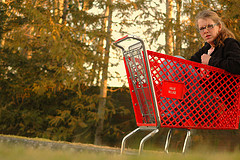Shopping for a Library
February 16th, 2010 I liked this post about a library experience Marilyn Johnson wrote while researching her book, This Book is Overdue!* - actually, I like reading any non-librarian review of a library experience, because it's the best way to learn how well libraries are serving patrons.
I liked this post about a library experience Marilyn Johnson wrote while researching her book, This Book is Overdue!* - actually, I like reading any non-librarian review of a library experience, because it's the best way to learn how well libraries are serving patrons.
Another post worth reading is Do Library Staff Know What The Users Want? (via Jessamyn). Good user experience has to start with library staff making an effort to accommodate patrons' needs and wants, but we will not out-smart (or out-stupid?) patrons about everything.
"Anticipate and respond" are words to live by, but it's also a good idea to go right to the source. Here are a few ideas for that:
- Easy-to-find suggestion box at each service desk and online (and promote it)
- Teen advisory board, or Adult Advisory Board, or ESL Advisory Board, etc
- Focus groups (private and confidential) and open forums to invite comments, reviews and suggestions
- Encourage members of the Friends of the Library to regularly relate their library experiences, good and bad
- Trustees organize a "secret shopper" program - especially to test out library policies, which will help keep them up-to-date with patron needs
- Have evaluations at the end of each program (library-sponsored as well as club/group meetings) and ask open questions as well as specific questions about the facility
- Pay attention to what people ask - if everyone needs to ask where the bathroom is located, that might be an area to improve
- If a patron comes to you with a comment/complaint/suggestion, listen, and encourage (but don't require) them to put it in writing to make actionable paper trails
- Ask friends and family what their experiences have been
- Visit other libraries for a fresh perspective, and share ideas with other librarians
- Then of course, celebrate Work Like A Patron Day
[Please share additional ideas in the comments]
And when you do make adjustments based on patron input, get feedback on the new setup, too. Nothing is static, and it's possible to improve improvements.
Using the library shouldn't be annoying or complicated or antagonistic. Occasionally patrons tell me that they come to my library because the staff at their town's library was rude or unhelpful, or they can't find parking, or the policies are prohibitively restrictive. It should make me feel good about where I work, but really it makes me sad they had to shop around for a library.
I am glad they came to us, but I also always tell them to make sure they report their complaints to their home library to make sure they know about it and can work to improve it. Most of the time they laugh at that idea, as if they've washed their hands of their home library. What really worries me are the people who have a bad experience at one library and never go back or to another one, and instead take their information needs, community participation, children, and votes elsewhere.
There has to be a balance between what the patrons need and what each individual library can offer, but if we don't support our patrons, why would they support us?
*Full disclosure: I was mentioned in the book (page 20 and 258!), but absolutely read it anyway. And if you're interested in obituaries, I also enjoyed her previous The Dead Beat.
And check it out - there's a contest to win a This Book Is Overdue! mousepad

February 17th, 2010 at 7:46 pm
I liked what a previous place of work (public library in Texas) did with comments and complaints. Every comment and complaint that was received in writing (whether by email or paper) was responded to in public.
The comment / complaint was anonymized (patron and staff information was edited out) and a response was given by the Director. Both the comment and the response were then published on the library’s internal web site and in a binder that was kept near the front door. New responses were published every Tuesday.
This was very popular with patrons and demonstrated transparency to the public and to staff.